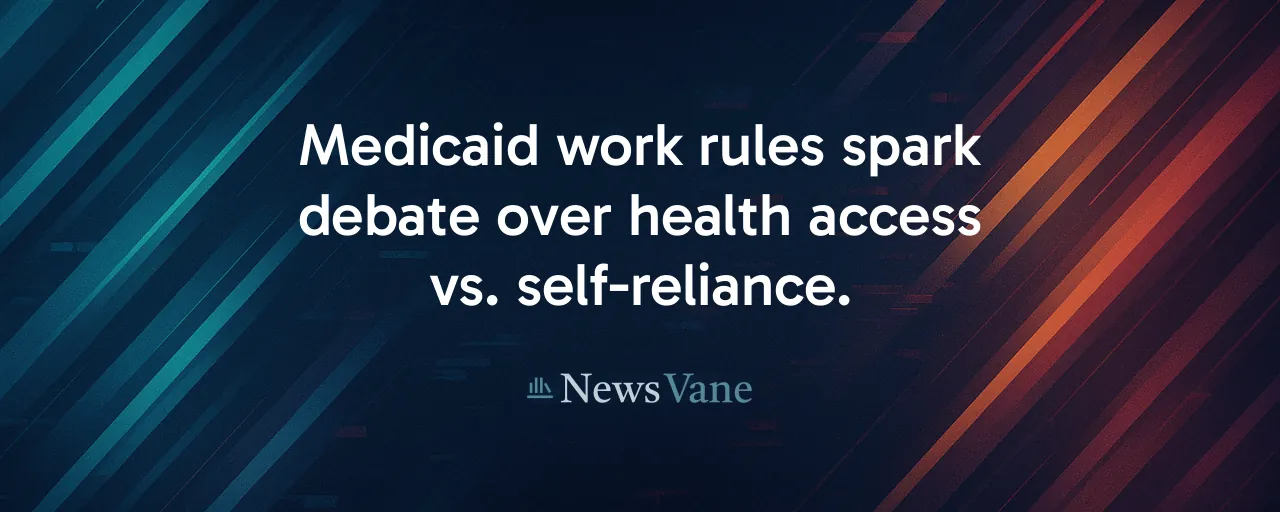A Farmer's Work Ethic Ignites a Policy Clash
Senator Roger Marshall's recent claim that Kansas farmers harvesting wheat work grueling 20-hour days has thrust Medicaid work requirements back into the spotlight. Speaking on the Senate floor in early July 2025, Marshall argued that expecting able-bodied adults to work, study, or volunteer for 20 hours a week to keep Medicaid coverage is reasonable.
His remarks, amplified across social media by journalist Aaron Rupar, have reignited a fierce debate over whether such rules promote self-reliance or unfairly strip health coverage from vulnerable Americans. The controversy touches a nerve because Medicaid, serving about 82 million people, is a lifeline for low-income families, seniors, and those with disabilities. Attaching work conditions to eligibility raises high stakes: supporters see a path to dignity through labor, while critics warn of coverage losses that could deepen poverty and worsen health outcomes. This tension demands a closer look at the evidence, moving beyond mere rhetoric.
Marshall's wheat-field analogy, meant to evoke hard work, oversimplifies a complex issue. Farmers face seasonal bursts of intense labor, but many Medicaid enrollees juggle unstable, low-wage jobs with caregiving or health challenges. The question is whether mandating it for health coverage helps or harms those it targets.
The Evidence: Jobs Up, Coverage Down
Research paints a sobering picture of Medicaid work requirements. In 2018, Arkansas launched a pilot requiring 80 hours a month of work or related activities. The results were stark: 18,000 people lost coverage within months, with studies finding no significant increase in employment. Peer-reviewed evaluations, including those from health economists, confirm this pattern across other state experiments. Work rules often lead to enrollment drops rather than job gains.
Why the disconnect? Many enrollees already work, often in retail, service, or agriculture jobs with unpredictable hours. Kaiser Family Foundation data shows 64% of adult Medicaid expansion enrollees work at least part-time. For others, barriers like childcare gaps, transportation issues, or chronic illness make meeting hourly thresholds tough. Paperwork hurdles also trip up compliant workers, as Arkansas's error-prone reporting system showed.
Administrative costs add another wrinkle. States are required to build verification systems, coordinate with labor agencies, and process exemptions for disabilities or caregiving. Georgia, the only state enforcing work rules in 2025, has spent millions on such systems, with limited evidence of workforce benefits. These findings suggest rigid mandates may miss the mark.
Economic Ripples and Social Costs
Work requirements carry economic weight beyond individual coverage. Urban Institute models project that a national mandate could lead to 5 million people losing Medicaid, many of them working adults with volatile schedules. This could shrink GDP by $43 billion to $59 billion and cut 322,000 to 449,000 jobs, as reduced health access lowers productivity and raises medical debt. Rural hospitals, already strained, could face higher uncompensated care costs, threatening closures.
Socially, the impact hits hard. Losing coverage often worsens health outcomes, particularly for chronic conditions like diabetes or hypertension, which are common among low-income adults. Racial health disparities could widen, as marginalized groups face higher barriers to compliance. Supporters of work rules argue they foster self-esteem and community ties, pointing to the 1996 welfare reform's emphasis on personal responsibility as a model.
Lessons From Decades Past
Medicaid's history offers context. Launched in 1965, the program never required work, focusing instead on access for the poor. The 1996 welfare reform, which tied cash aid to employment, inspired later pushes to apply similar logic to health coverage. By 2018, states like Arkansas and Kentucky tested work rules via federal waivers, only to see courts strike them down for undermining Medicaid's core goal: providing care.
Recent years show a pendulum swing. The Biden administration rescinded most waivers in 2020, but Georgia's 2023 program and 2025 congressional proposals signal renewed momentum for work conditions. These cycles highlight a persistent divide: one side sees work as a ticket to stability, the other sees health as a prerequisite for it.
Crafting a Fairer Approach
Finding balance requires learning from past missteps. Some centrists propose "community engagement" pilots that pair voluntary work programs with robust supports like job training, childcare, and transportation. Indexing hourly requirements to local unemployment rates could account for regional job scarcity. Automating verification through state wage databases might ease paperwork burdens, ensuring fewer people lose coverage over technicalities.
Exemptions matter, too. Clear, accessible carve-outs for caregivers, students, or those with disabilities could protect vulnerable groups. Gradual phase-ins, paired with real-time evaluations, would allow policymakers to adjust before harm spreads. These steps aim to test work's role in health policy without punishing those already stretched thin.
A Crossroads for Health and Work
Medicaid work requirements sit at a tense intersection of values: personal responsibility versus universal care. Evidence suggests rigid mandates often cut coverage without boosting jobs, yet the push for self-reliance resonates with many. The challenge is designing rules that uplift without excluding, drawing on data over anecdotes.
Policymakers face a clear choice. They can double down on strict thresholds, risking economic and social fallout, or they can innovate with flexible, supportive programs that respect both work and health. Compromise isn't flashy, but it's practical, offering a way to test ideas while safeguarding access.
As debates heat up, one thing is certain: solutions must prioritize people over politics. Whether inspired by Kansas farmers or urban workers, the goal is a system that fosters opportunity without leaving anyone behind. The path ahead demands precision, not just passion.
